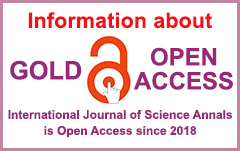|
1Kharkiv Regional Public Organization “Culture of Health” (KRPOCH), Ukraine
2 Scientific Research Institute KRPOCH, Ukraine
|
Material and Methods: A complex of methods was used: theoretical – factor-criterion analysis, abstraction, comparison, synthesis, systematisation, generalisation; empirical – observational methods (systematic observation); methods of mathematical analysis.
Results: The study of the indicators dynamics showed that different approaches to solving the pandemic problem in Ukraine and Singapore had significant differences. Compared to Singapore in Ukraine for 4 months in 2020, the number of COVID-19 cases is 22.5 times higher, the number of recovered is only 6.5 times higher, and the number of deaths is multiple times higher: 2908.5 times. The connection between the dynamics of the COVID-19 pandemic (cases, recovered, deaths) in Ukraine, Singapore, China and the measures taken by the governments of these countries, as well as the personal responsibility of the population, was determined in the study.
Conclusions: The infection which appeared in one country can transform into a global world problem in a matter of seconds. Responsible policy and practice instead of manipulation and bureaucracy are able to protect people of the risk group and create favourable conditions for life activity of those who do not belong to this group. Important factors in successfully overcoming the pandemic is the personal responsibility of citizens and health culture of the population.
COVID-19, pandemic, indicators, dynamics, health culture
Butcher, B., & Massey, J. (2020, April 17). Are ethnic minorities being hit hardest by coronavirus? The BBC. Retrieved from https://www.bbc.com
Croxford, R. (2020, April 12). Coronavirus: Ethnic minorities ‘are a third’ of patients. The BBC. Retrieved from https://www.bbc.com
Exec. Order, Office of the Mayor Lightfoot, Chicago (2020, April 7). Retrieved from https://www.chicago.gov
Huaxia (Ed.). (2020, February 2). China builds new hospital in 10 days to combat coronavirus. XinhuaNews. Retrieved from https://www.xinhuanet.com
Johns Hopkins University, Coronavirus Resource Center. (2020). COVID-19 Dashboard by the Center for Systems Science and Engineering (CSSE). Retrieved from https://gisanddata.maps.arcgis.com/apps/opsdashboard/index.html#/bda7594740fd40299423467b48e9ecf6
Jon, I. (2020). A manifesto for planning after the coronavirus: Towards planning of care. Planning Theory, 19(3), 329–345. doi:10.1177/1473095220931272
Koops, R. W. (2020, October 16). The year of disguises. American Institute for Economic Research. Retrieved from https://www.aier.org/article/the-year-of-disguises/
Kulldorff, M., Gupta, S., & Bhattacharya, J. (2020). The Great Barrington Declaration. Retrieved from https://gbdeclaration.org/
Kummitha, R. K. (2020). Smart technologies for fighting pandemics: The techno- and human- driven approaches in controlling the virus transmission. Government Information Quarterly, 37(3), 101481. doi:10.1016/j.giq.2020.101481
Lu, H. (Ed.). (2020, February 3). China’s Wuhan carries out disinfection operations to curb epidemic. XinhuaNews. Retrieved from https://www.xinhuanet.com
Melnyk, Yu. B. (2002). Formuvannia kultury zdorovia uchniv pochatkovoi shkoly [Formation of the health culture of primary school pupils]. Pedahohika, psykholohiia ta medyko-biolohichni problemy fizychnoho vykhovannia i sportu – Pedagogics, psychology, medical-biological problems of physical training and sports, 23, 37–49. [in Ukrainian]
Melnyk, Yu. B. (2004). Dialektyka zdorovia [The dialectics of health]. In F. V. Lazarev (Ed.), World Ethical Forum “One world – a healthy person” (pp. 214–216). Yalta, Crimea. [in Ukrainian]
Melnyk, Yu. B. (2005, April). Fenomen “kuljtura zdorov’ja” (metodologhichnyj ta metodychnyj aspekty) [The phenomenon of “health culture” (methodological and methodological aspects)]. In G. L. Apanasenko (Ed.), World Ethical Forum “Ethics and Humanism” (pp. 177–179). Alushta, Crimea. [in Ukrainian]
Melnyk, Yu. B. (2012). Kontseptualni zasady formuvannia kultury zdorovia osobystosti molodshoho shkoliara [Conceptual basis of personality’s younger schoolboy health culture formation]. Kharkiv: KRPOCH. doi:10.26697/9789669726001.2012 [in Ukrainian]
Melnyk, Yu. (2017). Monitoring of formation health culture of schoolchildren. Journal of Physical Education and Sport, 17(4), 2073–2079. doi:10.7752/jpes.2017.s4210
Melnyk, Yu. B. (2010). Sotsialno-pedahohichni zasady formuvannia kultury zdorovia v uchniv pochatkovoi shkoly [Socially-pedagogical basis of elementary school pupils health culture formation (Dissertation Abstract, Taras Shevchenko Luhansk National University, Luhansk, Ukraine). Retrieved from https://ekrpoch.culturehealth.org/jspui/handle/lib/105 [in Ukrainian]
Melnyk, Yu. B., & Sviachena, S. M. (2000). Kultura zdorovia: avtorska prohrama spetskursu dlia uchniv I-III klasiv [Health culture: author’s program of a special course for pupils of classes I-III]. Kharkiv: NVK No. 12. [in Ukrainian]
Melnyk, Yu. B. (2007). Teoretychne obgruntuvannia sotsialno-pedahohichnoi tekhnolohii formuvannia kultury zdorovia v pochatkovii shkoli [Theoretical substantiation of socio-pedagogical technology of health culture formation in primary school]. Visnyk Kharkivskoi derzhavnoi akademii kultury – Bulletin of the Kharkiv State Academy of Culture, 21, 234–241. [in Ukrainian]
Pirtle, W. N. L. (2020). Racial capitalism: A fundamental cause of novel coronavirus (COVID-19) pandemic inequities in the United States. Health Education & Behavior, 47(4), 504–508. doi:10.1177/1090198120922942
Press Trust of India. (2020, March 3). Indian-American Seema Verma appointed as key member of US COVID-19 task force. The Economic Times. Retrieved from https://economictimes.indiatimes.com
Trabucchi, M., & De Leo, D. (2020). Nursing homes or besieged castles: COVID-19 in northern Italy. The Lancet Psychiatry, 7(5), 387–388. doi:10.1016/S2215-0366(20)30149-8
Wenham, C., Smith, J., & Morgan, R. (2020). COVID-19: the gendered impacts of the outbreak. The Lancet, 395(10227), 846–848. doi:10.1016/S0140-6736(20)30526-2
Melnyk Yuriy Borysovych – https://orcid.org/0000-0002-8527-4638; Doctor of Philosophy in Pedagogy, Associate Professor; Founder and Chairman of the Board, Kharkiv Regional Public Organization “Culture of Health”; Director, Scientific Research Institute KRPOCH; Kharkiv, Ukraine.
| |
APA
Melnyk, Yu. B. (2020). International View at Health: World after Pandemic COVID-19. International Journal of Science Annals, 3(2), 24–32. https://doi.org/10.26697/ijsa.2020.2.4
Harvard
Melnyk, Yu. B., 2020. "Article Review “International View at Health: World after Pandemic COVID-19". International Journal of Science Annals, [online] 3(2), pp.24-32. viewed 20 December 2020, https://culturehealth.org/ijsa_archive/ijsa.2020.2.4.pdf
Vancouver
Melnyk Yu. B. International View at Health: World after Pandemic COVID-19. International Journal of Science Annals [Internet]. 2020 [cited 20 December 2020]; 3(2):24-32. Available from: https://culturehealth.org/ijsa_archive/ijsa.2020.2.4.pdf https://doi.org/10.26697/ijsa.2020.2.4












